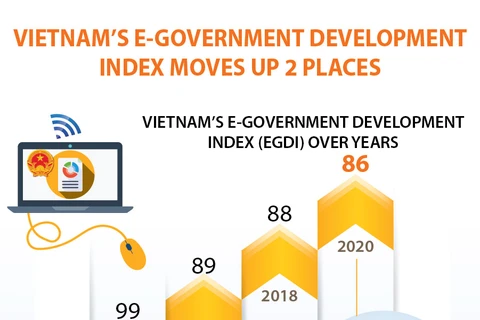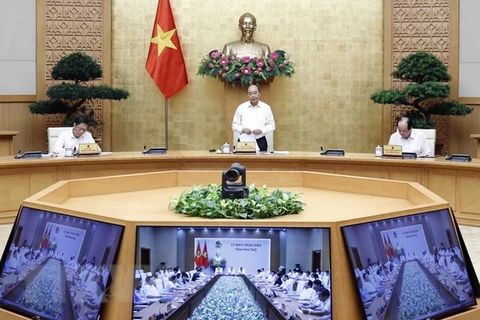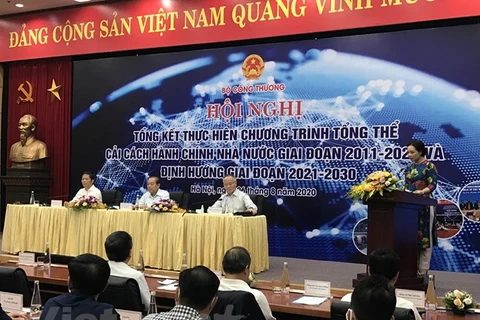Hanoi (VNS/VNA) - Database sharing between management agencies at both central and local levels is key to the process of developing e-government, experts have said.
The Ministry of Information and Communications is compiling an e-government development strategy, with services a pillar in Vietnam’s socio-economic development model.
Under the draft strategy which has been made public for comments, the development of e-government will be associated with the process of digital transformation and smart urban development and ensuring network safety and security.
Accordingly, all operations of State management will be digitalised to lead the national digitalisation process.
Citizens and enterprises will be centre of the digitalisation process which will aim at improving transparency, simplifying administrative procedures and creating convenience when accessing public services.
The most important thing was developing a database system and data sharing mechanism between State management agencies, according to the ministry’s Authority of Information Technology Application.
The strategy aims to link the development of e-government with Vietnamese digital technology enterprises which have core technologies and open platforms to serve digital government services.
Notably, enterprises could participate in providing public administrative services.
By 2025, 100 per cent of national databases to serve e-government, including the database about population, land, business registration, finance and insurance, are hoped to be completed, connected and shared on a nationwide scale.
A representative from the Vietnam Posts and Telecommunications Group said it was important to develop databases and data sharing to launch the digital government services.
It was also necessary to carry out reviews on the process of transition from paper-based to digital and develop procedures for digital government services.
Prime Minister Nguyen Xuan Phuc has approved the list of members of the National Committee on e-government, in effect from July 31. The PM chaired the committee.
The committee is in charge of studying and proposing policies, strategies and mechanisms to create a legal framework for the development of e-government towards a digital Government, digital economy and digital society to create favourable conditions for implementing Industry 4.0 in Vietnam.
According to the United Nations’ recent report themed 'Digital Government in the Decade of Action for Sustainable Development', Vietnam ranked 86 out of 193 countries in the e-Government Development Index, moving up two spots from 2018./.
The Ministry of Information and Communications is compiling an e-government development strategy, with services a pillar in Vietnam’s socio-economic development model.
Under the draft strategy which has been made public for comments, the development of e-government will be associated with the process of digital transformation and smart urban development and ensuring network safety and security.
Accordingly, all operations of State management will be digitalised to lead the national digitalisation process.
Citizens and enterprises will be centre of the digitalisation process which will aim at improving transparency, simplifying administrative procedures and creating convenience when accessing public services.
The most important thing was developing a database system and data sharing mechanism between State management agencies, according to the ministry’s Authority of Information Technology Application.
The strategy aims to link the development of e-government with Vietnamese digital technology enterprises which have core technologies and open platforms to serve digital government services.
Notably, enterprises could participate in providing public administrative services.
By 2025, 100 per cent of national databases to serve e-government, including the database about population, land, business registration, finance and insurance, are hoped to be completed, connected and shared on a nationwide scale.
A representative from the Vietnam Posts and Telecommunications Group said it was important to develop databases and data sharing to launch the digital government services.
It was also necessary to carry out reviews on the process of transition from paper-based to digital and develop procedures for digital government services.
Prime Minister Nguyen Xuan Phuc has approved the list of members of the National Committee on e-government, in effect from July 31. The PM chaired the committee.
The committee is in charge of studying and proposing policies, strategies and mechanisms to create a legal framework for the development of e-government towards a digital Government, digital economy and digital society to create favourable conditions for implementing Industry 4.0 in Vietnam.
According to the United Nations’ recent report themed 'Digital Government in the Decade of Action for Sustainable Development', Vietnam ranked 86 out of 193 countries in the e-Government Development Index, moving up two spots from 2018./.
VNA

























